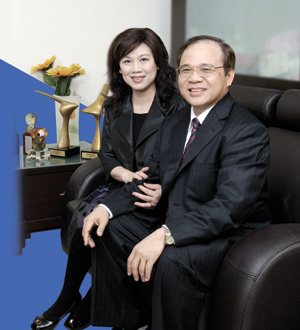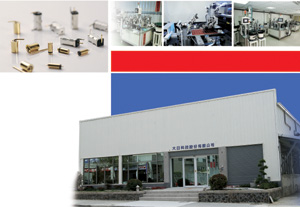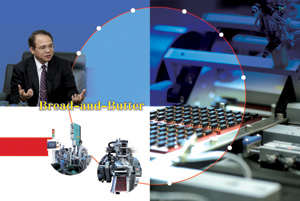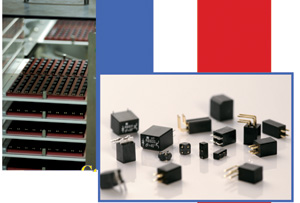OncQue Corp.
Roll-ball switches, tilt switches, vibration
2009/03/25 | By Ken Liu | ONCQUE CORP.Founder E.C. Chou is living-proof that bureaucratic bumbling in Taiwan can put a bizarre twist on an otherwise well-planned beginning. The man originally christened his firm "OneQue," abbreviated for "One Quality," but a business registration clerk misspelled it "OncQue Corp.," and the oversight stuck. Such official incompetence, if allowed to casually handle the Chinese corporate name, would not likely have been left uncorrected; for some people pay fortune tellers to cull lucky Chinese characters for personal and business purposes, while "canine" and "big" in Chinese are identical except merely a tiny "dot."

Forsaking Teaching Career
The birth OncQue Corp. would not have been without Chou's enterprising personality, which drove him to, some 30 years ago, attend the Kaohsiung Institute of Technology, the forerunner of National Kaohsiung University of Applied Sciences, instead of possibly becoming a teacher by going to the National Chunghwa University of Education.

"We're the world's first manufacturer of tilt-sensing switches using eco-friendly mechanisms," Chou claims.
According to Chou, Russia is the world's major market for mercury-tilt switches, which are adopted in many gimmicky, consumer products like "flashing footwear," the kind with integrated lights that flash as a user walks. "Such use of the mercury switch in footwear is a convenient solution that taps the inherent characteristics of the mechanism, which has the semi-solid mercury, pulled by gravity inside a housing, turning lights on and off," he explains. OncQue Corp. replaces mercury with a sand-grain-sized, gold-plated copper ball. "Gold is highly oxidation-resistant and copper is a good conductor," Chou notes.

Besides offering switches that are fully RoHS compliant, the company now is trying to market its line by promoting safety advantages. One such item is the roll-sensing or tilt-sensing switch, which has been designed to cut off current upon rollover of machinery, equipment for example in rough terrain or accidents. Chou shows such application with an electric fan in his central Taiwan office equipped with one of its tilt-sensing switches. After pushing over the fan, Chou demonstrates the effectiveness of the switch-the fan stops immediately and has to be restarted by the ON button. "Our switch is doubly safe for it won't automatically restart the fan after emergency shutoff, for it's better to be safe than sorry," he says. Similar fans by other makers usually restart automatically after being placed upright.
To enhance the user-friendliness of its tilt switch, Chou builds into the device an infra-red sensor so it can be triggered by the metal ball when the ball rolls to mask the switch-off sensor. "It's a thoughtful design for elderly and young users," he notes. In addition the safety switch is also ideal for heaters. In fact Chou sees other uses for such switch in various home appliances to minimize fire hazards, a view with potentially huge market impact. Currently, Taiwan has no safety regulations for home appliances, only for buildings.

Bread-and-Butter
OncQue Corp. has seen its switches installed in digital cameras, bicycles, notebook computers, mobile phones, remote controllers, tire-pressure measure systems, cars, treadmills, and so on. But Chou says that Microsoft's XBox 360 gaming machines have been his bread-and-butter, with over half of his 30-million switches exported yearly going into such video games.
Chou built the prototype of his first switch three months after having brainstormed the concept, and has acquired to date many patents, mostly in Taiwan, the U.S. and China, as well as a spate of official citations for his outstanding work.
However, turning prototype into volume produced switches was perhaps even more challenging, for such machinery did not exist. "So I had to design the machines from scratch by working with machinery manufacturers," he recalls. Today, OncQue Corp. runs several dedicated production lines, each of which turns out 100 switches per minute or so, an incredible feat considering each switch is smaller than a toothpick.
Clearly not mainstream in the switch segment, likely an advantage for product uniqueness, OncQue Corp.'s products, Chou stresses, help boost added-value in products, which is important in today's markets where the "me-too" syndrome is rife. "Ours are novel, unique and eco-friendly," he says. But counterfeits have emerged, mostly from mainland China.
Costly Road
Pursuing product uniqueness has been a long road for Chou-racking up seven years in the red for its products were too novel to achieve immediate market acceptance. However, Chou says he'd rather sell unique but less-than massively popular products than underpriced generic products, a hardline belief cultivated the hard way. "My first business in selling garden-variety appliances taught me that, when selling generic products, you can only compete on price regardless of qualitative improvements."
Chou also puts money where his heart is-budgeting some 8% to 15% of annual corporate revenues for R&D, which is critical to turning out unique products.
A pot of gold awaits those who persevere: OncQue Corp. began turning profitable in the eighth year to see revenues triple in 2005 and increase past NT$100 million (US$3 million at US$1:NT$33) in 2006. Currently, the company operates three factories in Taiwan. But bigger sales are breeding grander plans-the company is looking to expand, with one of the most high-profile moves being the acquisition of a lot in a central Taiwan industrial park dedicated to the precision-machinery industry. "Uniqueness is our most trustworthy security blanket for we are not suffering as badly as other manufacturers in other sectors amid this recession," Chou reports.




